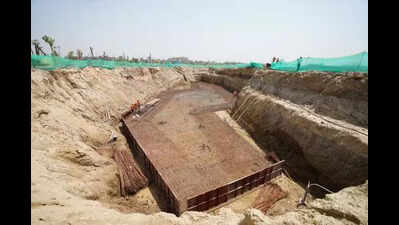New Delhi: A special committee set up by Delhi High Court has identified numerous irregularities in the functioning of the city’s sewage treatment plants (STPs).The committee inspected all 37 STPs across the city from May to July. The assessment focused on verifying whether the sewage flowing into the Yamuna through these STPs underwent proper treatment before discharge, confirming the installation of flow meters and sensors at all STP outlets, and ensuring proper monitoring without unauthorised bypassing, among other aspects.The findings revealed significant shortcomings, including substandard treatment processes, inadequate data calibration, insufficient monitoring, untreated sewage being bypassed and instances of treated sewage getting mixed with untreated waste before being discharged. It also flagged industrial effluent being diverted to STPs meant to cater to domestic sewage and issues with sensors, online monitoring systems and flow meters, which resulted in evident lags in crucial data. The report also asserted how treated sewage from some plants was being dumped into untreated drains like Shahdara. “Thus, the money spent on the treatment has literally gone down the drain!”According to the report dated July 25, “In many STPs, the incoming effluent consists of a large quantity of industrial effluent, which the STP is not designed to deal with. Conversely, CETPs (common effluent treatment plants) are receiving a large quantity of domestic sewage as part of their incoming industrial effluent, which they are not designed to deal with.” Hence, the committee recommended proper demarcation of the domestic sewage and the industrial waste to prevent inter-mixing. It added that urgent strict actions were needed by authorities like Delhi Pollution Control Committee against the dumping of industrial effluent or cow dung in domestic sewage.The report also flagged how about 11 STPs adhered to older and less-strict DPCC norms on parameters like biochemical oxygen demand and total suspended solids, etc. Recommending upgradation, it said that during the process, new online monitors and flow meters be installed at the inlet and outlet so that accurate data of the water quality parameters of the incoming wastewater and the treated effluent can be monitored by both STPs and the public. It also asked DPCC to ensure that all sensors are calibrated annually to ensure the authenticity of the water quality data.“This is particularly important since the committee was repeatedly informed that the flow meters and the sensors experience regular breakdowns due to wear and tear and even the presence of industrial effluent in the STP,” the committee pointed out.Earlier in May, the high court decided to set up a panel to investigate if a substantial portion of water was bypassing the newly installed flow meters and sensors in the STPs meant to monitor pollution in the Yamuna.A special bench of Justices Prathiba M Singh and Manmeet PS Arora pointed out that the “entire purpose of STPs would be defeated if the water/sewage is permitted to bypass the flow meters and the sensors at the outlet”. A special committee of govt officials, lawyers and petitioners was set up to inspect all flow meters and STPs.The court was hearing a suo motu matter on waterlogging in the city and asked the panel to provide a report on whether the entire sewage/water flowing into the Yamuna through the STPs was being treated before being released into the river.
